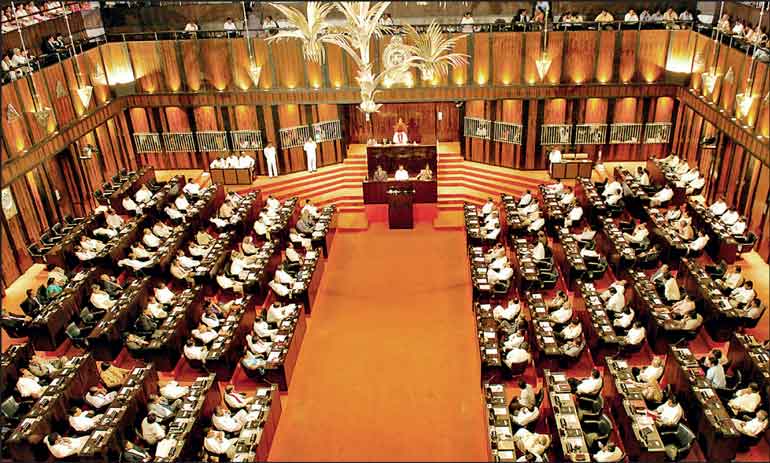Wednesday Feb 18, 2026
Wednesday Feb 18, 2026
Monday, 4 September 2023 00:10 - - {{hitsCtrl.values.hits}}
 Now, under the 21st Amendment and the provisions of the Anti-Corruption Act all three commissioners and the director general must be appointed by the President on the recommendation of the Constitutional Council. Safeguards against arbitrary removal now exist
Now, under the 21st Amendment and the provisions of the Anti-Corruption Act all three commissioners and the director general must be appointed by the President on the recommendation of the Constitutional Council. Safeguards against arbitrary removal now exist
No drafting is perfect, as was evidenced by the incorporation of a significant number of amendments after the bill was gazetted. What well meaning citizens and organisations must do is to engage with decision makers to ensure that the draft is improved, understanding that not all of their changes can be accommodated because there are multiple demands that have to be reconciled. If we can revert to the practice of issuing white papers and eliciting inputs from knowledgeable persons and stakeholders early in the legislative process, it will be even better
 A recent article on the Anti-Corruption Act, enacted in July, quoted the Deputy Executive Director of Transparency International Sri Lanka as saying, “From the start, we have maintained that the lack of law has not been the weakness in addressing the problem of corruption in Sri Lanka. We always had laws that were poorly enforced and implemented.” This echoed the claim of the JVP leader, also prominently reported, that the previous legislation was sufficient and that the only problem was the will to enforce.
A recent article on the Anti-Corruption Act, enacted in July, quoted the Deputy Executive Director of Transparency International Sri Lanka as saying, “From the start, we have maintained that the lack of law has not been the weakness in addressing the problem of corruption in Sri Lanka. We always had laws that were poorly enforced and implemented.” This echoed the claim of the JVP leader, also prominently reported, that the previous legislation was sufficient and that the only problem was the will to enforce.
It takes less effort to make such blanket claims than to analyse the previous legislation and the reasons for the poor performance of the Commission to Investigate Allegations of Bribery or Corruption (CIABOC), assess the analyses of experienced professionals who served as Directors General, and to examine the provisions of the new Act which is a complex piece of legislation. But unless that effort is made in good faith, good governance will be unachievable.
If Occam’s Razor is applied, laziness adequately explains the blanket condemnations. But is there something more at work?
Legislation as a necessary condition
CIABOC’s primary activity is investigation, as indicated by its name. Under the old dispensation, CIABOC’s investigators who were seconded from the Police were not accountable to the Commission. Not being CIABOC employees, their loyalties lay elsewhere; their career prospects were decided by their superiors in the Police. Whenever a government changed, transfers were made. Worse, specific investigators could be picked out and vindictively transferred to remote locations. This would naturally influence their investigatory zeal.
The new Act makes possible the remediation of this fundamental flaw. The Commission is now empowered to recruit the required personnel and to exercise disciplinary control over them. Of course, this depends on whether it is allocated adequate funds and its decisions on cadre and compensation are not adversely constrained.
Under the previous Act it was not possible for the Commission to engage in joint investigations (or even share information) with the Police or the Financial Investigations Unit of the Central Bank. It is indisputable that present-day bribery and corruption are more sophisticated than passing an envelope under the table. Sophisticated crimes require sophisticated investigations and investigators. Under the new Act joint investigations with entities possessing the required expertise are explicitly permitted.
Many prosecutions under the old Act failed because the courts held that every indictment had to be signed by all the commissioners. The new legislation gives the Director General the authority to institute criminal proceedings on the direction of the Commission, a straightforward provision that includes checks and balances.
Under the old Act, CIABOC had to conduct all prosecutions. Its lawyers were not as well compensated as their peers in the Attorney General’s Department and were less experienced in conducting complex prosecutions. The new Act allows the Commission to seek the assistance of the Attorney General in the conduct of prosecutions.
The previous asset declaration procedure which required hard copies to be filled up every year and submitted to designated bureaucrats who may or may not have kept them in secure conditions was quite dysfunctional. The new Act introduces online asset declarations that cut out questionable intermediaries. Provisions to make public asset declarations stripped of sensitive personal information have been introduced. It was an offence under the old law to make asset declarations public.
Any fair-minded person looking at the changes that have been introduced and the explanations above can see that the previous legislation had serious shortcomings. However much the “will” to enforce there was on the part of a director general or a commissioner, it is clear that successful investigation could not be carried out by police personnel looking over their shoulders, worried about penal transfers; that sophisticated financial crimes could not be investigated without the required skilled personnel and partnerships. The evidence of procedural failures is there for those who are willing to look.
This is just a sampling of problems in previous legislation that led to poor performance by CIABOC. The ideologically motivated JVP leader saying that the law was perfectly adequate for successful prosecutions is understandable. According to the JVP the only meaningful reform is to put them in power.
But what about others, such as the above quoted Deputy Executive Director? Are they also ideologically driven, or just plain lazy? What about the journalists who relegate evidence such as that presented above to the very end of the article, choosing to lead with broad-brush condemnations?
The sufficient condition
In my emailed responses for the above article, I said, “Of course, implementation is key. For that the quality and commitment of the staff (which depends on their salary packages and working conditions) and the leadership provided by the Director General and the Commission are sufficient conditions. The Act has created the necessary conditions.”
It is too early to judge whether the sufficient conditions have been met. At least, the appointments to this important and sensitive organisation will not be made at the sole discretion of the individual who occupies the position of President as was the case in 2020, when persons whose principal qualification was fealty to the Rajapaksa family were appointed. Now, under the 21st Amendment and the provisions of the Anti-Corruption Act all three commissioners and the director general must be appointed by the President on the recommendation of the Constitutional Council. Safeguards against arbitrary removal now exist.
General conclusions
The draft of the Anti-Corruption Act was completed in 2018, based on the experience of those who had the thankless task of implementing the defective statute then in force and by drawing on the lessons of jurisdictions such as Hong Kong, which had made extraordinary progress in suppressing and prosecuting acts of bribery and corruption.
No drafting is perfect, as was evidenced by the incorporation of a significant number of amendments after the bill was gazetted. What well meaning citizens and organisations must do is to engage with decision makers to ensure that the draft is improved, understanding that not all of their changes can be accommodated because there are multiple demands that have to be reconciled. If we can revert to the practice of issuing white papers and eliciting inputs from knowledgeable persons and stakeholders early in the legislative process, it will be even better.
All this requires commitment and effort from those managing the legislative process and citizens and organisations. The current lazy and/or ideological approach to legislation must be minimised, if not eliminated.